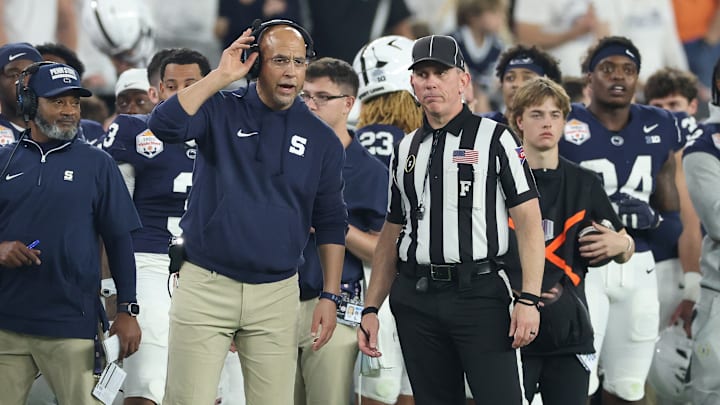With college football nearly two weeks away, the National Football Foundation (NFF) and College Football Officiating (CFO) released a new update of rules and guidelines in attempt to address the complaints, tactics, and loopholes that rose in 2024.
"The mission of the Rules Committee is to develop and evaluate rules changes that will enhance the sport, protect the image of the game, and enhance the student athlete's health and safety," CFO's Steve Shaw said in the press release. "Player safety has been the highest priority of the committee for many years now resulting in significant changes that have improved the game in terms of mitigating injuries."
Addressing fake injuries:
One of the most prominent rule changes the committee passed is to crackdown on player faking injuries. Now, if an official sees a player go down with an injury after the ball is spotted, their team will be charged with a timeout or a delay of game penalty if no timeouts remain. The player must also stay sidelined for at least one snap and receive approval from their team's medical staff.
Before, an injured player resulted in a free timeout, disrupting the flow of the game and giving teams a tactic to unfairly manage the clock while not dishing out their timeouts.
Overtime timeouts:
One timeout was initially permitted to each team in each overtime period. Starting in 2025, teams will receive one timeout in each of the first two overtime periods. After that, teams will only have one timeout to use for the remainder of the game. During the first two overtime periods, media timeouts will continue on as usual, but no TV timeouts will be in place from the third period on.
Pre-snap movement and designated signals:
Any pre-snap movement from the offense or defense within one yard of the line of scrimmage will result in a penalty. This includes quick, abrupt, or exaggerated movements on defense in attempts to cause an offensive false start. Any pre-snap movement that simulates action at the snap will also be charged a false start for the offense.
Defensive players not allowed to use words or signals to confuse the offense either. Offensive players are the only ones allowed to clap while the defense was granted "move" and "stem" as its exclusively, designated signals.
Similarly with signals, any "T" sign given by a returner during any kick is considered invalid. If a returner uses this signal, the team can no longer advance the ball after the catch.
Defensive substitutions:
Substitution fouls will result in a five-yard penalty and the offense can decide if they want the clock to reset to the time it was at the snap. This includes the final two minutes of each half.
Defenseless players:
To reinstate order after a fumble, any player that attempts to recover the loose ball will be considered a defenseless player.
Unsportsmanlike conduct:
Players who simulate brandishing a weapon was added to the list of unsportsmanlike acts and will result in an automatic unsportstmanlike conduct foul.
Referee announcements following instant replay:
Rather than using the terms "confirmed" and "stands," officials will now say "upheld" if they are not overturning the ruling on the field.
For the full list of rule and guideline changes, visit the NFF's site here.
